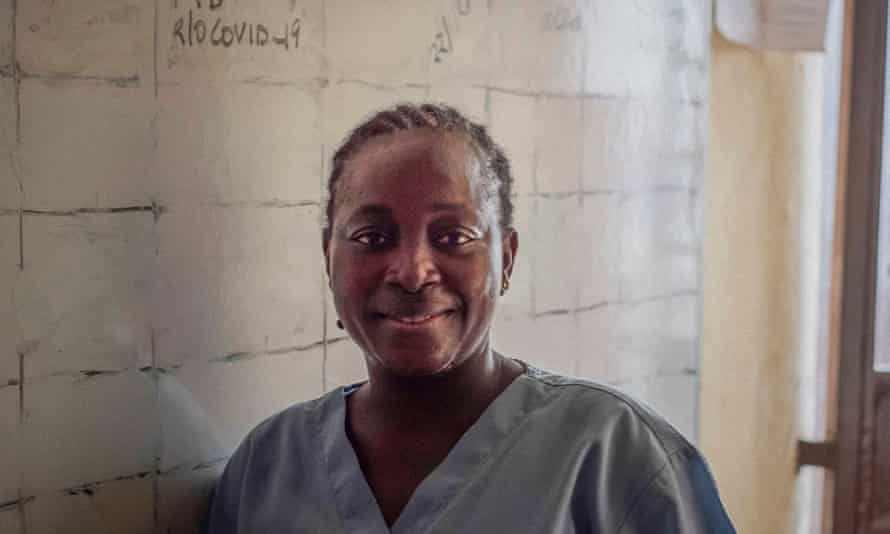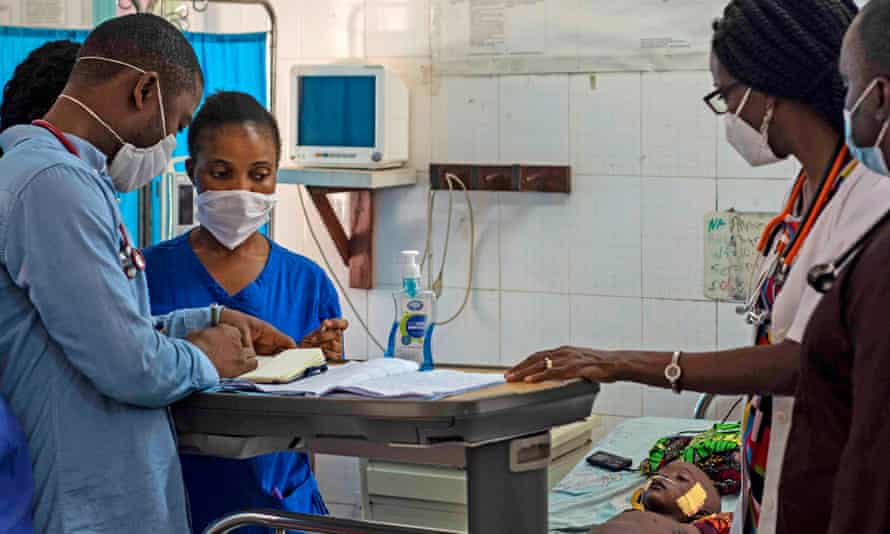Nurse Magdalene Fornah was on duty at Freetown’s Connaught hospital when she heard that Sierra Leone had its first confirmed coronavirus case. It was five years after Ebola had killed about 4,000 people in the small country, ravaging the fragile health system. Soon after that initial case was announced last March, the UN estimated that 3.3 million people across Africa could die of Covid-19.
Like the rest of her medical colleagues, Fornah had no idea this nightmare scenario would not come to pass. “When I saw the first patients, I was scared,” she says.
She committed herself to learning from their experience of Ebola, especially with personal protective equipment. “We should not joke with the [PPE] dressing,” Fornah drummed into the staff. “That’s a mistake we made earlier.”
Fornah is a small woman of great courage. She worked on the frontline at Connaught’s Ebola outpatient post and contracted the disease herself. But PPE is scarce in a country that ranks among the 10 poorest in the world. Donations from the World Health Organization, the UN and others brought masks and gloves for the isolation unit. But with attention shifting to Covid-19, other wards were rapidly running out of supplies.

“We do experience some serious challenges with PPE supply,” says Sorie Conteh, a specialist at Connaught’s department of medicine. “We have to ration it.” In a stocktake for the Connaught, one of only three such government hospitals, Conteh lists CT scans, endoscopes and ventilators as missing.
Early Sierra Leone had 13 ventilators for a population of almost eight million. With only 79 deaths to date officially, this shortage was not too critical. However, while Covid is not proving to be the killer disease in Sierra Leone that it is in many western countries – maybe due to its younger population – its impact is being felt in different ways.
At Ola During children’s hospital, the only one of its kind in Sierra Leone, Nellie Bell has to fight disease and chronic shortages. As well as lacking a working X-ray machine, the 42-year-old doctor is constrained by the lack of “simple things”, such as thermometers.
Until recently Bell was the only paediatrician in a country where one child in 10 dies before their fifth birthday. Then she became Sierra Leone’s second registered coronavirus case. With Ebola still fresh in people’s minds, the government took drastic measures and Bell was quarantined at a military hospital. When a number of staff also tested positive, her whole hospital was shut down.
“I cannot name a figure but I’m pretty sure a good number of kids died,” Bell says. With Sierra Leone’s sole paediatric referral centre closed, children and young people were dying in ambulances waiting for somewhere to go.
Ishmeal Charles, founder of the Sick Pikin Project (“sick child” in Krio, or Creole), tells a similar story. His organisation sends sick children abroad for life-saving surgery. When the government closed the airport even before Covid-19 had reached Sierra Leone, Charles’s young patients could no longer be flown out. “In these four months we lost seven babies,” he says.
Ola During hospital reopened after six weeks but still can only run at a third of capacity. Even with only 100 patients instead of 300, Bell and her team have to make tough decisions. When a child was diagnosed with severe respirational distress, they wanted to try Cpap (continuous positive airway pressure ventilator). But none of the three machines was free. “We had to decide: ‘Which one is most likely to die if we give no Cpap?’”
The pandemic has has had aserious impact on healthcare in other waysRising numbers of malaria cases are in line with the WHO’s fear thatprogress in combating the mosquito-borne disease could go into reverse as resources are reallocated to deal with Covid. Early in the pandemic parents refused to go to hospitals for fear of catching the virus or, since Covid and malaria share fever as a symptom, people were afraid of being quarantined.

Shifts without children dying remain rare in the clinic. “We clap when that happens,” Bell says.
At Ola During’s ICU, a three-year-old boy is lying still in bed, his eyes slightly open. “Malaria has reached his brain,” one of Bell’s colleagues explains. The child’s prognosis is poor. A third of children admitted with malaria do not survive; more die without ever reaching hospital.
At Connaught hospital Fornah has little time to consider whether malaria or Covid is the bigger threat. “Both are dangerous,” she says, swathed in PPE, before heading off to the isolation ward.
This content first appear on the guardian
